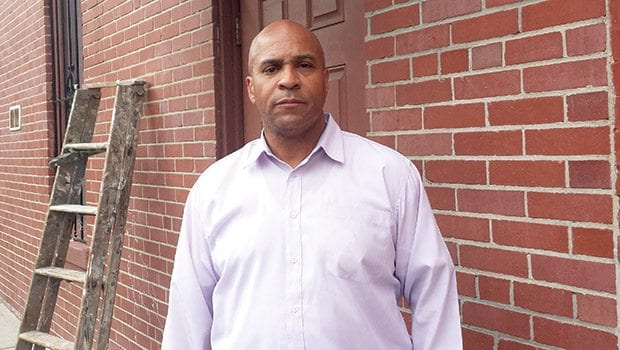U.S. marshals raid Roxbury radio station
Charles Clemmons says "our community will not be silenced".

Elected officials and community activists are rallying around the Grove Hall-based underground radio station Touch 106.1 FM radio after U.S. Attorney Carmen Ortiz ordered U.S. marshals to shut down the unlicensed station.
The marshals showed up last Thursday, and removed broadcasting equipment from the station’s Cheney Street studio. Standing on the sidewalk outside the studio, station owner Charles Clemmons vowed to resume broadcasting.
“I’ll adapt, improve and overcome,” he said. “Our community will not be silenced.”
Within hours, Clemmons resumed programming with online streaming, but the radio broadcast, which has a three-and-a-half mile radius, has remained silent.
Clemmons has operated the station for the last eight years without a license. Touch 106.1 was one of three stations the U.S. Marshalls raided last week. Licenses for radio frequencies are regulated by the Federal Communications Commission.
“As prosecutors we work in conjunction with the FCC’s Enforcement Bureau to identify violators of federal communications law,” Ortiz said in a press statement. “It is a public safety hazard for illegal radio stations to broadcast, potentially interfering with critical radio communications.”
Elected officials, many of whom have been mainstays on the Grove Hall station’s broadcasts, were inundated with constituent calls, demanding action.
“Touch 106 is part of the fabric of the community,” said at-large City Councilor Ayanna Pressley. “We need to create more options for low-power stations. For many people in our community, it’s a main source of information.”
Gov. Deval Patrick, who has been a frequent guest at the station, expressed disappointment, telling reporters he asked Ortiz not to go through with the raid.
Patrick, Pressley and other councilors and legislators of color are working to help Clemmons obtain a low-power license and return to the airwaves, according to Pressley.
With the consolidation of media companies in recent decades, large corporate entities have come to dominate urban markets. Licenses for full-power stations, which can cost as much as $60 million in an urban market, are out of reach for many black entrepreneurs, Clemons says.
“When it comes to television and radio, black ownership in the media is at less than 1 percent,” he told the Banner. “We had [AM radio station] WILD for nearly 50 years, but we’ve never fought for more power.”
The FCC launched its low power service in 2000, in response to pressure from community groups, granting licenses to nonprofit entities to broadcast signals that could travel up to three-and-a-half miles from a transmitter. The licensing was halted within months, after corporate stations lobbied Congress.
The FCC fined Clemmons $17,000 in 2008 for operating without a license.
Clemmons and other low-power activists lobbied for years to pressure the FCC to grant new licenses. But when the commission did open a two-week window for new license applications in Oct. of last year, Clemons, who was then a candidate for mayor, says he was not notified and missed the deadline.
The other stations raided by U.S. marshals were 100.1 FM, broadcasting from Everett, Mattapan, and Brockton, with a studio in Dorchester, and 88.7 FM, broadcasting from Brockton.







